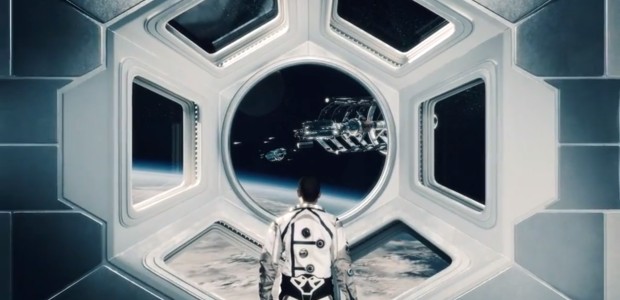
Shared posts
360° Panoramic Video Creates the Illusion of a Man Riding a Bike around a Tiny World


German photographer and journalist Jonas Ginter created a sweet panoramic camera rig using 6 GoPro cameras that he mounted above his bicycle and car. The resulting video makes it appear as though he’s pedaling around a tiny world. (via Stellar)
Pocket-Sized Wonder-Printer Would Work Its Own Way Across a Page

With what has to be one of the most ambitious Kickstarter projects to come along in a while, the folks behind this Mini Mobile Robotic Printer want to revolutionize the mobile office. Because of instead of carrying a page-wide device that has to pull paper through it, this little marvel will instead print directly on a piece of paper while it rolls around on top of it.
O Netflix começou a transmissão de conteúdos em 4K, e os primeiros programas disponíveis na resolução são a 2ª temporada House of Cards e documentários sobre a natureza. Só que o recurso estará disponível apenas para certas TVs Ultra HD, que tenham codificador HEVC (H.265) embuti...
 O Netflix começou a transmissão de conteúdos em 4K, e os primeiros programas disponíveis na resolução são a 2ª temporada House of Cards e documentários sobre a natureza. Só que o recurso estará disponível apenas para certas TVs Ultra HD, que tenham codificador HEVC (H.265) embuti...
O Netflix começou a transmissão de conteúdos em 4K, e os primeiros programas disponíveis na resolução são a 2ª temporada House of Cards e documentários sobre a natureza. Só que o recurso estará disponível apenas para certas TVs Ultra HD, que tenham codificador HEVC (H.265) embuti...
Heartbleed, The First Security Bug With A Cool Logo
 It's been fascinating to watch news of heartbleed, the massive OpenSSL exploit, spread on the web. After years of quietly putting us at risk, the general web user became aware of the exploit only a few days ago, and probably via heartbleed.com. Read More
It's been fascinating to watch news of heartbleed, the massive OpenSSL exploit, spread on the web. After years of quietly putting us at risk, the general web user became aware of the exploit only a few days ago, and probably via heartbleed.com. Read MoreWhat Every Escalator Needs
Historias de GRR Martin por @grrmartinez
→ NSA Said to Exploit Heartbleed Bug for Years
The U.S. National Security Agency knew for at least two years about a flaw in the way that many websites send sensitive information, now dubbed the Heartbleed bug, and regularly used it to gather critical intelligence, two people familiar with the matter said.
Of course they did. Assholes.
I’m with Joel Housman on this one. Obama’s campaign was so unbelievably full of shit that I regret ever having supported it. I thought I was voting against Bush-era principles, but I was foolish to believe that I was being presented with any real choice.
It’s a shame that the American people are so easily distracted by media fads and planted political non-stories to understand the real ways that our actual rights, our actual freedom, and our actual national security are being destroyed by our own government while the idiots are all kept busy arguing about which minorities they want to persecute next.
If an organized hacker ring sabotaged security standards and major tech infrastructure for years, compromising the security of hundreds of millions of people and many governments including our own (and potentially causing billions of dollars in damages when these exploits were found by others), and exploited any flaws they found or created to spy on millions of people in the world including our own citizens, what should they be charged with?
Mass criminal sabotage, cybercrime, cyberwarfare, and computer fraud? Obviously.
Terrorism? Maybe, but not quite.
At what point do the NSA’s actions qualify as treason?
I’d say they’re well past that point.
ryancrobert: fucking show-off
Newswire: Game Of Thrones’ “Khaleesi” is now a more popular baby name than “Betsy”

In a trend that, as we reported a few months ago, has also resulted in a bunch of baby “Skylers” crawling around, in 2012 more American parents named their daughters after characters on Game Of Thrones than “Betsy” or “Nadine”—both super boring names that have never appeared on any TV shows about dragons.
According to data from the Social Security Administration, in 2012, 146 Khaleesis were born in the United States, an exponential increase from the five Khaleesis born in 2010. Interestingly, zero Khaleesis were born before 2010, a good 14 years after George R.R. Martin published his first Song Of Ice And Fire book, confirming that people care way more about TV than books. Meanwhile, a mere 21 newborns were named “Daenerys” in 2012, suggesting that, overall, parents would prefer their daughters live empowered, post-raw horse heart-eating lives.
The use of “Arya” has also been on a ...
Beyond Earth Takes Civilization to the Stars
Humanity’s childhood has ended, the cradle of Earth abandoned so that we can find ourselves among the stars. As its name suggests, Sid Meier’s Civilization: Beyond Earth leaves behind our collective past--which this long-running strategy series has so thoroughly documented--and turns its gaze skyward towards our future. Cast upon some unknown world, you will encounter alien life, push the limits of humanity, and inevitably come to blows with your fellow man over whose vision of the future is "correct." For fans of the 1999 classic Sid Meier’s Alpha Centauri, this game has been a long time coming, and for the Civilization development team, it’s a liberating experience to finally be free from the constraints of history.
"You could see the enthusiasm in the team when they heard about this project," said Lena Brenk, one of Beyond Earth’s lead producers. "It is a very liberating thing, as all the gameplay systems we designed for Civilization are done so with an eye towards, 'Does it fit with the history of humanity?' [Beyond Earth] has been a huge opportunity to go ahead and do things that would not be possible in a historic setting." I recently spoke to Brenk, along with other members of the development team, about the many changes this game brings to the Civilization formula, and how a game of Beyond Earth compares to a game of Sid Meier's Civilization V.

Sid Meier’s Civilization: Beyond Earth begins at the end. Due to some sort of global catastrophe, which the developers only referred to as "The Great Mistake," Earth is experiencing a mass exodus. The various factions of humanity are piling aboard starships and setting forth in search of a new home for their species. With each new game of Beyond Earth, you play the role of one of these desperate expeditions.
In Beyond Earth, not only do you choose your faction, but also which spacecraft to take, what cargo to carry, who to bring, and the type of planet you want to inhabit. Each choice will greatly impact the start of your game.
Before you land on a new planet and start shaping humanity’s destiny, you must first equip your expedition. Referred to as "the seeding," this is an expanded version of your civilization selection in previous games. In Beyond Earth, not only do you choose which faction (read: civilization) to play, but also which spacecraft to take, what cargo to carry, who to bring, and the type of planet you want to inhabit. Each selection you make will greatly impact the start of your game: you could carry high-quality cargo that grants additional funds up-front, for instance, or hard-working, production-oriented colonists who build structures faster. The Civilization series has always been about defining a strategy early on, and then adapting that strategy to accommodate whatever curveballs the game throws your way. These choices should give you greater control over how you define your opening gambit.
After the seeding, you make planetfall and establish your first human colony. It is also the only human colony. The next human player won’t arrive until much later. In the beginning, you are completely alone amid the wilderness. "What’s neat about it is the feeling you get from coming into this new place," said lead producer Dennis Shirk. "It’s not the same as in other Civilization games where you already know you’re on Earth, the only threat is the occasional barbarian, and you’re going to run into other civilizations--and if one of those is Genghis Khan or Montezuma you know what your game is going to be like! With Beyond Earth, it’s basically you versus the environment in the beginning."
And by "environment," Shirk of course means alien lifeforms. Depending on the planet, these lifeforms may be indifferent to your arrival, or hostile. You must decide how to deal with them, and in doing so the development team hopes the experience will feel more isolated, more alien, than in previous games. You are setting forth into the unknown reaches of space, after all. It could be 20 turns or more before you see another player make planetfall and introduce themselves, and another 15 turns after that until the next. And if you think these newcomers are going to be easy pickings just because they were late to the party, think again. Those who arrive after you receive an extra boost to help them catch up to your civilization.

When other players start showing up, it will most likely result in open warfare. It was at this point in the interview that I asked whether Beyond Earth would bring back unit stacking, or continue using the one-unit-per-hex rule introduced in Civilization V. According to lead designer David McDonough, Beyond Earth will not have military unit stacking. "I am a big fan of the way warfare was designed in Civilization V," McDonough added. "I thought it was very elegant and would make a good fit for this game as well considering we’ve added these alternate game layers--such as the orbital layer--which sort of let you break that rule by launching units into space and having them effect units on the ground without being stacked on top of them."
The orbital layer is the realm of satellites. These satellites can grant your civilization an economic, espionage, or military benefit, but their orbit will degrade over time.
The orbital layer is the realm of satellites. These can grant your faction an economic, espionage, or military benefit depending on the type of satellite launched. Satellites also project coverage across the orbital layer, and this coverage doesn't overlap with other satellites. Securing coverage works on a first-come, first-serve basis, so you’ll need to move fast. However, once you have a satellite in the air it is by no means permanent. Its orbit will degrade over time, and it will eventually crash on the planet below, sometimes leaving behind recoverable salvage. Satellites can also be pulled out of orbit (read: crashed) manually or shot down by other players.
The orbital layer may let players skirt around the one-military-unit-per-tile rule, but it doesn't solve a lingering problem this rule created in Civilization V and its expansions: the AI. While this rule did create some interesting new strategies for players, the game’s AI had trouble executing those same strategies with any consistency. As an example, I often saw the AI push its archers to the front line, ahead of their sword-wielding brothers in arms, only to get slaughtered. When asked about this, McDonough explained, "We've had the opportunity to do a great deal of work and learn from the successes that Civilization V had with its AI to make AI suited for [Beyond Earth]. We’re confident it’s going to do a great job. We’re working hard on it and the war simulations we’re running in our test games are already pretty crazy and fun."
That’s good to hear, since the battles in Beyond Earth aim to provide even more variety than in the series’ past. This is thanks in part to the game’s new affinity system, an overarching belief structure which impacts every aspect of your civilization. There are three different affinities in the game: purity, harmony, and supremacy. Harmony, for example, focuses on understanding and adapting to your alien planet’s ecosystem.

Taken to the extreme, this affinity will drive your people towards rewriting the human genome so that they can fully integrate themselves as an indigenous species of that world. You scientific research will focus on the alien sciences, geology, and genetic engineering, and your military units will become faster, heal quicker, and take on a Predator-esque appearance.

You strengthen your affinity by doing quests or finding objects from expedition sites or by researching certain technologies--affinity works on a global level from the very first turn to the very last. Everything you do in the game feeds into the affinity system, and that system in turn feeds back into the very makeup of your civilization.
The team at Firaxis has a new, non-linear technology tree for Beyond Earth. In fact, it’s not so much a tree as it is a web.
Because this system can take humanity in some wildly different directions, chances are you won’t need to be researching all the same technologies as the other players. Therefore, the team at Firaxis has a new, non-linear technology tree for Beyond Earth. In fact, it’s not so much a tree as it is a web. As McDonough described it, this web was one of the team’s "first, favorite, and most fundamental redesigns." Each player starts surrounded by a web of technologies, with the technologies closest to you being something recognizable in today’s world, like engineering. From there you move outward in any direction towards more exotic--but still plausible--technologies.
"We call these major technologies 'branch' technologies," he added. "Each branch technology has a number of leaf technologies underneath it, representing specific specializations of the main branch. These leaves are also associated with one of the three affinities. Gaining allegiance to an affinity begins the path towards a technology victory specific to that affinity. At no time are you ever locked out of researching any technology, but it’s very unlikely you’ll be able to research everything in the game. By the end of the game, you will have a set of technologies that tells a story of who you are, and who you were."
As McDonough mentioned, the game’s three affinities are closely tied to three of the five possible victory conditions. Of course, if you’re not willing to take your affinity to its conclusion, there are two other options available that are affinity-neutral. The five victory conditions are:
Harmony: awaken a semi-sentient super organism within the planet and reach a new level of consciousness
Purity: terraform the alien planet into a mirror of Earth and relocate Earth’s populace to this new Eden
Supremacy: embrace cybernetic augmentation, then return to Earth and "free" the people from their bodies
Contact: discover evidence of intelligent life and construct a means to establish first contact
Domination: actually, domination is the same as in every other Civilization


Since most of these victory conditions involve several steps, the developers have designed a new quest system to help guide players along. The quests are also where Beyond Earth delivers the bulk of its narrative. "Because we’re going into the future, it’s not as clear where humanity will end up," explained Brenk. "Players don’t know anything about it intuitively, so being able to give this narrative framework for the player to tell their story is really important to us. When the game is released, we want to go on the forums and read those awesome stories fans post about their game. We love that stuff."
Affinities. Non-linear research. Satellites. Armed with these new features and others, Sid Meier’s Civilization: Beyond Earth is much more than "Civilization in space" or "Alpha Centauri 2." "While Alpha Centauri is in our DNA," explained Shirk, "we also made those games many years ago. They’re games we love, and that our fans love, but we wanted to approach [Beyond Earth] in a completely fresh fashion. Both games share some similarities--they’re both sim games about sending humanity into space--but in terms of being a strategy game, they don’t have much in common. We set out to create a completely new game, and we think a lot of the comparisons between this game and Alpha Centauri will be left behind as people see all the thing that are coming into play that makes this a completely new experience."
SMAC Your Lips: Civilization Beyond Earth Announced

This is news worth working on a weekend for. Firaxis have announced Civilization: Beyond Earth, a spiritual successor to Alpha Centauri. There’s an announcement trailer below, which doesn’t show any of the game but does set the scene. (The scene is of me, rubbing my thighs at all the spaceships). Also, it’s due out this “Fall/Autumn” which i) is not far away at all and ii) it’s nice that they wrote both Fall and Autumn because it makes me feel included as a non-American.
Next Civilization game abandons Earth for the stars

Civilization made a strategy game of humanity's past. Now it's looking to humanity's future.
Everyone who has played a game in the Civilization series remembers seeing their country nuked by Mahatma Ghandi. In this historical strategy series, players attempt to guide a nation through the ages from its humble beginning to its role as a globe-spanning superpower. Anything can happen along the way, including being irradiated by one of history's greatest peacemakers.
After five instalments in a series that attempts to capture the spirit of humanity's ascent from darkness, developer Firaxis has announced an unexpected follow-up. Instead of beginning in the dirt and building to the heavens, Civilization: Beyond Earth begins with a voyage in the sky, one that will send colonists to begin anew in another star system. Slated for release on PC, Mac and Linux this fall, Beyond Earth surely will remind fans of Firaxis' 1999 classic space exploration game Sid Meier's Alpha Centauri, although the developer seems eager to distance itself from that comparison.
By: Andrew Groen,
Continue reading...























